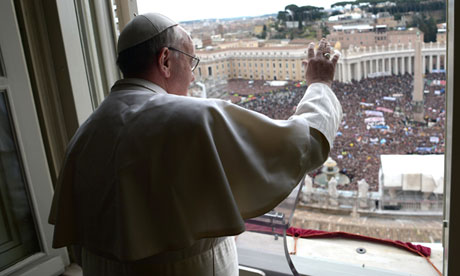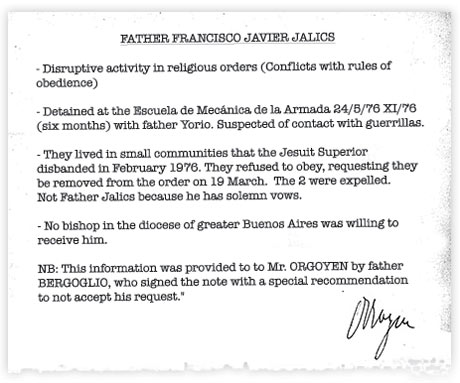New pontiff delights crowds with down-to-earth style at Sunday prayer as accusers continue to raise awkward questions

 A translation of the note explaining why Father Francisco Jalics was denied a passport renewal application. Source: Horatio Verbitsky
A translation of the note explaining why Father Francisco Jalics was denied a passport renewal application. Source: Horatio Verbitsky

Pope Francis gives his first Sunday prayer at the Vatican. Photograph: L'Osservatore Romano/Getty Images
Pope Francis has delivered his first Sunday prayer to a cheering, laughing crowd of about 300,000 people in St Peter's Square, amid hopes that his down-to-earth style will usher in a change in the Vatican.
But while many in Rome were looking forward, accusers in his nativeArgentina continued to raise awkward questions about the past and reproduced a document suggesting the Jesuit may have betrayed two of his priests to the murderous military dictatorship in the 1970s.
The sharply different perspectives have dogged the early days of the new leader of the Catholic church, who will be officially installed at an inaugural mass on Tuesday.
His capacity to rouse affection and optimism were in evidence as he mixed cheery greetings with humour and anecdotes at his inaugural Angelus.
Speaking in Italian rather than Latin, he joked with the crowd and ended by saying: "Have a good Sunday and a good lunch!" Pilgrims, many from Latin America, roared their approval.
Earlier on, Francis startled passersby in the Vatican when he emerged unannounced from a side gate. He then led mass at the small church of St Anna in the Vatican.
In St Peter's Square, he spoke of God's never-ending mercy and urged followers to be more forgiving. "A little bit of mercy makes the world less cold and more just," he said.
However, his critics in Argentina were unwilling to move on so quickly. The pope continues to be haunted by allegations dating back to the dictatorship era, when the Catholic church colluded with the generals to quell what they saw as a Marxist threat.
The Argentinian newspaper Pagina 12 republished old documents on Sunday that suggest Jorge Bergoglio, as the pope was known until last week, was in contact with the military authorities about the insubordination of two of his priests and rumours that they had contact with leftwing guerrilla groups.
Father Orlando Yorio and Father Francisco Jalics were tortured and kept in a concentration camp for nearly six months in 1976, after they refused Bergoglio's order to leave the slum where they were working. In that era, any priest who focused on the poor districts was under suspicion of collaborating with Marxist groups.
A foreign ministry memo from 1979 seems to suggest Bergoglio had passed on suspicions to the authorities, and connived behind the backs of the priests.
The typed note contains bullet points that explain why Jalics was denied a passport renewal application. He had fled to Germany following his release, and asked Bergoglio's help to get a travel document.
It says Jalics had failed to obey the orders of his religious order (the Jesuits, then headed by Bergoglio), that he was suspected of contact with guerrillas and that he and Yorio had asked to leave the order after the head of the Jesuits ordered them to disband the missions in the slum.
A potentially damning note at the end of this document says: "This information was provided to Mr Orgoyen by Father Bergoglio, who signed the note with a special recommendation not to accept his request [for a passport]." It appears to prove that Bergoglio said one thing and did the opposite when it came to the request for help with the passport application, and felt put out by indiscipline in his religious order. (The Jesuits were founded by a general and operate on military lines in the fight for the church. For them, discipline is a priority.)
 A translation of the note explaining why Father Francisco Jalics was denied a passport renewal application. Source: Horatio Verbitsky
A translation of the note explaining why Father Francisco Jalics was denied a passport renewal application. Source: Horatio Verbitsky
These documents were previously reproduced in a damning book on the church's role by the Argentinian journalist Horatio Verbitsky, who wrote another critical piece in Pagina 12. The accusations are now reaching a wider global audience.
They have been strongly denied by Bergoglio – who has testified in court about his role and never been charged with a crime. He has also told his biographers that he interceded for the priests' own safety and for the sake of the slum-dwellers they were working with.
The Vatican has denounced "a defamatory campaign" against the pope. Last week, spokesman Federico Lombardi said there had never been a credible, concrete accusation against Pope Francis. "There have been many declarations of how much he did for many people to protect them from the military dictatorship," he said.
Jalics, who is in a monastery in Germany, broke his silence about the case with a short and ambiguous statement on Friday in which when he said he was "unable to comment on the role of Father Bergoglio in this matter".
He mentioned he had since met and discussed the events with Bergoglio. "We celebrated mass publicly together and hugged solemnly. I am reconciled and on my part, consider the matter to be closed. I wish Pope Francis God's rich blessings for his office."
Yorio is now dead, but he previously told associates that he believed Bergoglio was partly responsible for what happened to him. His role may not have been criminal, but many in Argentina believe the documents show it was at least a sin of omission.
"It is evidence but it is not categorical," said Domingo Bresci, a priest who studied with Bergoglio in the 50s and who knew Yorio. "I agree that he didn't protect them enough, but I don't agree that he brought them to be killed."